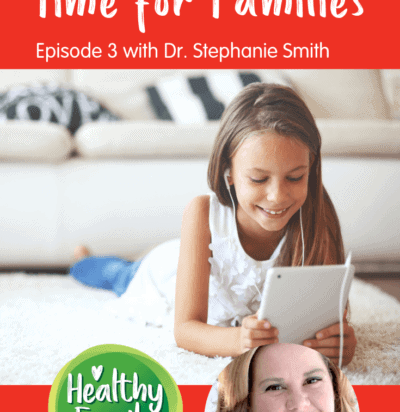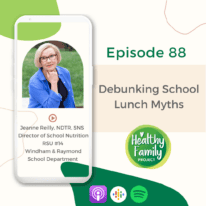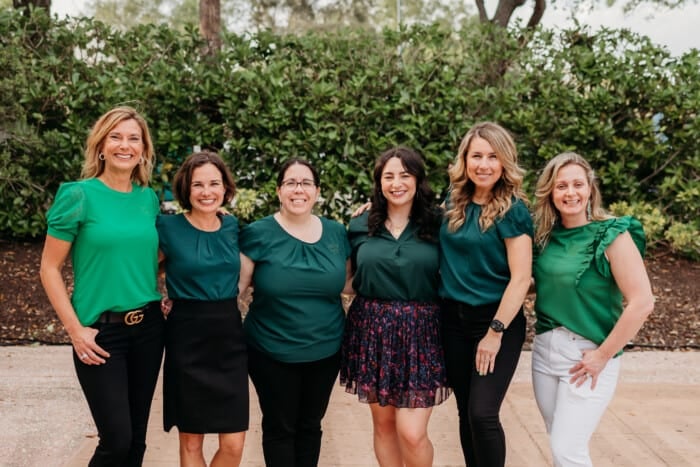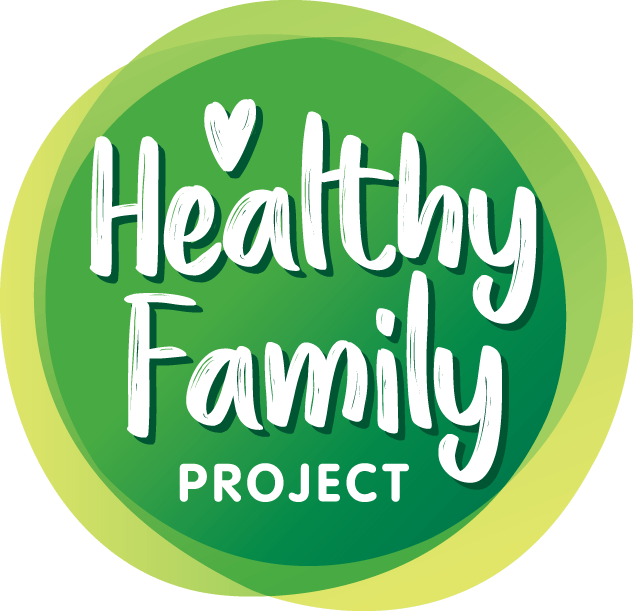Episode 3: Managing Screen Time
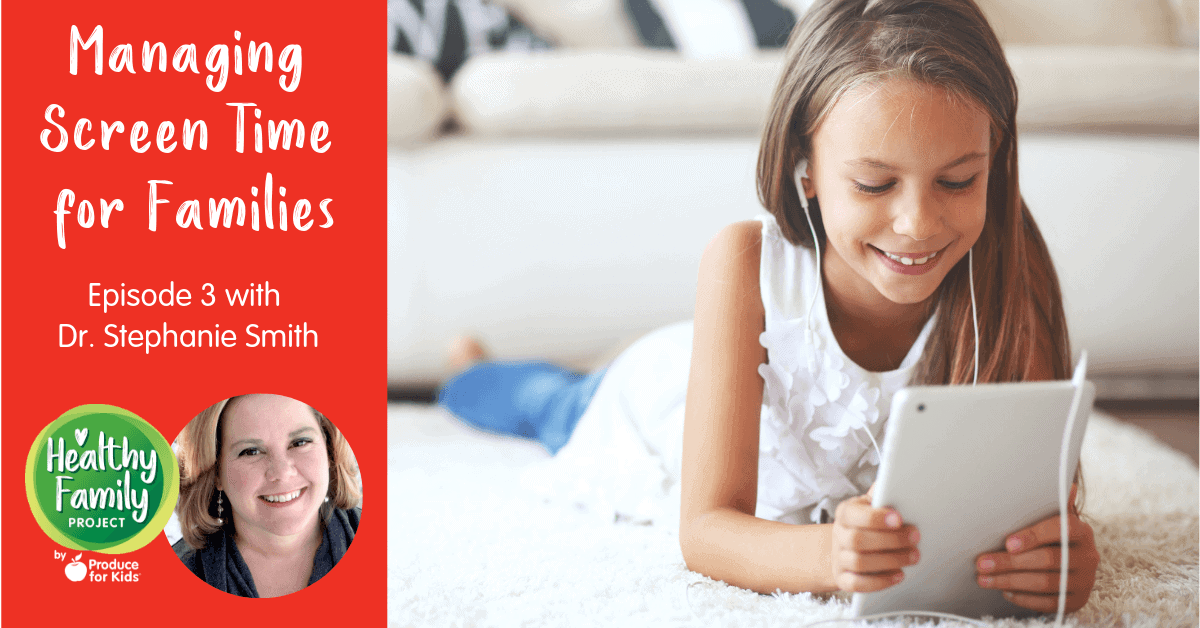
In this episode of Healthy Family Project, we talk to psychologist, Dr. Stephanie Smith, about managing screen time, including how to set screen time limits, how to keep guidelines in place and how parents can set an example for their kids.
Dr. Stephanie Smith is a mother, clinical psychologist, author of Dr. Stephanie, living in a suburb of Denver, Colorado. In her practice, she works with moms, dads, teens and tweens.
Dr. Smith uses humor, compassion and common sense to help people make positive changes in their lives. She especially enjoys working with parents to assist them in strengthening their families from the inside out.
Dr. Smith is the author of Dr. Stephanie, a blog where she writes about technology, parenting, friendship, and pop culture – all with a mental health twist. In addition, Dr. Smith is an official blogger for the American Psychological Association’s blog, Your Mind, Your Body.
Dr. Smith believes eating nutritious foods, creating healthy eating environments, and learning to enjoy all stages of food preparation and eating are important goals for families.
Listener Survey!
Thank you so much for supporting the Healthy Family Project Podcast! We’d love it if you could take 5 minutes to let us know how we can bring you the best possible content for future episodes. Take the survey here.
Healthy Recipes & Tips in Your Inbox
Sign up for the Healthy Family Project e-newsletter to receive healthy recipe inspiration, our latest blog posts and more directly to your inbox each week.
Healthy Family Project Facebook Group
Join our Healthy Family Project Facebook group! This group will serve as a safe space for parents and caregivers to talk all about raising a healthy family – from dealing with a picky eater and tips to get more fruits and veggies onto plates to exercising as a family and mental health. We welcome all of you to join in!
Read through the questions asked in this podcast in the “Ask the Psychologist” blog post – Managing Screen Time.
Want to skip straight to a hot topic? See time stamps below. But of course, we recommend listening all the way through!
- 2:21 – Recommendations for helping families set guidelines for screen time.
- 7:20 – Keeping guidelines in place.
- 11:50 – Teaching kids to respect a balance between surroundings and time spent on devices.
- 15:30 – What happens if you already have bad screen habits going on? How to get back on track.
- 18:40 – Practice what you preach. Setting examples for screen time use.
- 23:00 – Long-term effects of overuse of screens.
Related Links:
Healthy Family Project Podcast
Conversations covering hot topics in the world of health, food and family with a dose of fun. Helping families ease their way into a new fresh and healthy world.
Be on the lookout for new bi-weekly episodes and don’t forget to subscribe on Apple Podcasts, Google Podcasts, Spotify or your favorite podcasting site. If you like an episode, make sure to leave a rating and comment.
If you are interested in being a guest on the Healthy Family Project podcast, contact amanda@healthyfamilyproject.com with your topic idea for consideration.
Transcript for Episode 3
This transcript was produced by Otter.Ai. Please forgive any misspellings and grammatical errors.
00:13
Welcome to the healthy family project by produce for kids, covering the hot topics in the world of health,
food and family with a dose of fun. Today we welcome Dr. Stephanie Smith, mom of three psychologist
and founder of Dr. Stephanie smith.com. She has experience working in multiple settings including
Hospital Community Mental Health, long term care school and private practice. Her clients range from
adults and couples to kids and teens. At practice for kids, we have been fortunate to have worked with
Dr. Stephanie as a regular contributor to The produce for kids blog, on produce for kids.com for nearly
six years. We wanted to bring Dr. Stephanie to the show today, just in time for summer to talk to us about
managing screentime in our digitally immersed world. Hi, Dr. Stephanie, welcome to the healthy family
project.
01:04
Hi, thanks for having me.
01:06
It’s great to talk to you today. This is a this is a hot topic as we go into summer. But before we dive into
those tips on managing screentime, can you tell us a little bit about you and the inspiration behind Dr.
Stephanie calm.
01:20
So I just started my blog quite a few years ago, just as a way to hopefully make psychology and mental
health accessible to everybody. I really try to make my articles and tips, easy to understand, and easy for
folks to read and actually take back to their own families and their own lives. Tips that they can
implement right away.
01:51
That’s wonderful. It’s definitely you know, there’s those topics, of course, there is a time where you would
want to seek, you know, out a psychologist to talk to one on one, but I know that there are a lot of
questions that parents and families that we have, and it’s so important to have that accessibility. You
know, right there, right there online. So we thank you for that. And we thank you for all that you’ve been,
you know, the information that you’ve provided to our produce for kids families, as well. So, so we live in
a day and age that our kids from a very young age have interaction with electronic devices, whether that
be an iPad, or you know, a tablet, computers, I know, there are a lot of you know, the Gameboy type of
things out there. So what are your recommendations on helping families set guidelines on screen time?
02:45
Well, you know, I think there’s, there’s actually quite a bit of research going on all the time about screen
time, and kids and adults too. And how much is too much? How much is okay? And the American
Academy of Pediatrics just last year, revised their guidelines. And so what they’re saying is, and they’re
really the gold standard for these types of things, and what they’re saying is, children under two should
really not have any screen time at all. So that’s meaning, you know, television, handheld devices, tablets,
computers, that we should really try to not introduce those to kids under two. And then Okay, kids, ages
two to five. And this is a new guideline just last year, they’re saying they should be limited to one hour per
day, or less, of course, would always be good. And then children over five, you know, up through teenage
years should have to or less, it becomes a little more complicated. With older kiddos once they hit
elementary and middle school and high school because so much of their schoolwork can be on screen.
Yes. So they do make the distinction that those school hours on screens or homework on screens is not
does not count in this overall screen time. Okay? So but of course, you know, families are going to have
to make their own decisions about that they may decide, you know, you get enough in school, we’re not
going to let you do any at home. But anyway, that’s, that’s what the American Academy of Pediatrics
says. So two years and under zero screentime, you know, minutes or hours of screen time per day, two
to five is one hour per day, and over five or six and over two hours or less. Okay, so I think that knowing
those recommendations are important because these are the folks that are doing the research. You know
that they have the most up to date information about screens and how it affects mental and physical
health. But beyond that, of course, each family needs to set their own priorities and guidelines about
what works for them. And I think the best first step with that is to just have a conversation between mom
and dad or grandparents or caregiver, whoever is involved in setting up schedules for the kids in the
house. Those folks need to get together and almost treat it like a meeting as you would at work to talk
about the stuff and, you know, what, what do we want? What do we want our family to look like? What do
we want our kids lives to look like? And kind of go from there?
05:50
Yeah, that’s it, it’s good to hear those the guidelines, you know, that have been set out there. You know,
to it’s, I think it’s would be surprising to a lot of parents because of how much screen time I think our kids,
our kids really get these days, we’ve started a new thing in our house where I know another mom, on our
producer, kids team is doing the same thing, we both have kids the same around the same age seven
and 11. So we say these are these are yours, but they stay here, you know, they have a location. And
essentially, you have to come and sort of check them out. And so it helps them understand, okay, this
isn’t just always accessible to me, it’s in a spot, I have to cut, you know, like a library book or something
like that, like I check it out, I have this amount of time to spend. So do I want to spend my time right now?
Or is there you know, later this evening? Or am I gonna want to, you know, to? So they kind of get it
helps them understand that? While it is is their device, essentially it there’s a time, you know, there’s time
constraints, the place where it belongs. And so that has been helpful in our house, because we were a
little getting a little bit out of out of hand, I think.
07:09
Easy to do.
07:10
Yes. So I think you know, we know these guidelines, but what is your advice on on keeping it keeping
these guidelines in place? So we know an hour for this certain age? And I guess I kind of talked about
what we’ve been doing that that really has been working for us? Do you have any advice to help parents
because I know, you know, you’re in the restaurant, you’re waiting for your meal to come? You have the
toddler? It’s just so easy to pass over that that phone? And you know, kind of occupy them in that way.
So I guess how to how do we parents? How do we stay on track?
07:50
Well, I think that’s that’s the million dollar question, right? Because of everything you just said, it’s, it can
be hard to accurately estimate how much time we’re really letting our kids spend online, or in front of
screens. It can be hard when we’re in like you say, a restaurant or in a meeting, and we just need them
to be quiet. And this is, this is a pretty good way to get them to be engaged so we can focus on
something else. So I guess the first thing I would say is give yourself and your kids some grace, like
none of us is perfect. We’re not going to be perfect, they’re not going to be perfect. And that’s not the
point. The point is just to be mindful and planful about screentime in general. Because the natural
tendency is for it to just sort of take over our lives, like you were saying like, Oh my gosh, all of a sudden,
the kids are spending like way more time on screens than we thought because we’re not being very
planful about how we’re going to monitor them or use them. So, like I said, I think it’s important to work
toward having a little more control and a little more structure, but also giving yourself grace to know that
some days are going to be worse than others. Some writers get the stomach flu and they’re going to
watch five movies, right. I’ve been there. Yeah, I mean, it just, you know, that’s okay. But I one of the
things that’s really helped in my family and my kiddos are a little bit older than yours, almost 14, almost
12 And then I have a six year old. You know, they really need to have their phones a lot of the time
because they’re not with me a lot. I need to know where they are. So we found that one of the things that
helped us eliminate the struggle we were having the fight We were having like, Get off your phone, get
off your iPad, was to look into some of these parental monitoring apps. And I’m not like an owner of any
of these apps or anything, but it really helped us to do some research into what was out there. And then
install one of the apps that lets us manually set a schedule for when our kids can be using screens and
when they can’t. And the one we use, we can also set it up in a way where, you know, maybe they get
two hours a day total. And once they’ve hit that two hours, it just shuts off. So what that allows us to do is
just not engage in that back and forth that I think happens in so many households, like, get off the phone
just a minute, I’m almost done with this right now. Like this, that becomes the big drama, right? It’s not
even so much the screen time after that. It’s just this chaos and yelling. So I do think it’s important to look
into the tools and resources that are out there to see what might fit your family’s needs best.
11:16
That’s great advice, because that it truly makes so much sense to just identify the time everyone’s aware,
this is when it shuts down. So you avoid those interactions that can be not so fun.
11:31
Right? Exactly. Exactly.
11:34
Right. So what are your thoughts has, so I feel like everywhere we turn their screen, so how can we
teach our kids about screen time in a way that they learn to respect a balance between their
surroundings and the time spent on their device. And so they really do understand why we’re saying get
off of your tablet or get off of your phone.
11:56
So I think one of the the best things we can do as parents is just to engage our kids in conversation,
obviously, at a developmentally appropriate level, but just be talking to them about these kinds of things,
and hearing their feedback. So for example, one of the other things the American Academy of Pediatrics
recommends is helping kids understand the difference between an advertisement and just regular
content, like a TV show versus an advertisement or of vlog versus, and, and I don’t know that it’s ever
super useful to just be lecturing our children, but to engage them in conversation, like, what do you think
the differences are? How can how can you know if something’s an ad, or something is, is regular
content? What do you how do you feel when you’re, you see an ad for, you know, cereal? Does that
make you like, want this cereal? Does that make you write twice about having an egg? I mean, so I think
that’s just a little example. But I think those types of conversations can be great for all sorts of tricky
things that come up about, you know, online content, just in general. You know, as our kids get older, we
we want to start having conversations about what they’re posting online, and what the ramifications of
those things are and understanding truth versus fiction online. You know, so I think, again, just opening
up this dialogue, this back and forth, you know, tell me what you think, what are you hearing? What are
you thinking, I think that can be the best way to help them strike a nice balance between there physical
surroundings and what they’re experiencing online.
13:59
Right. That’s an excellent point. And I think in in today’s day and age, it becomes hard even for adults
sometimes to differentiate what is an ad and what is not an ad because it’s just, it’s, it’s hard. It really is
because the content, you know, it’s not a back in the day where it was like, this is advertising and this is
your editorial, or, you know, it’s so intertwined, that it can be difficult for everybody.
14:28
That’s right. And I think that’s why it’s nice to set up that conversational tone. Because, you know, there
going to be times when our kids are going to teach us things and we want the flow of direction to flow of
information to go both ways. And not, you know, just we’re the expert all the time, right? Because we’re
not,
14:50
no and I tell my daughter, my daughter’s that all the time. You know, I’m learning from you too. So I’m not
perfect, although they do think that you know, I’ve never made a mistake in my life. But I say, Listen, I
have promised you I am learning right along with you. But I’ve had more time. Yeah, I can offer a little
more advice to you guys. Absolutely. Okay, so what if you’re a family that’s already in way too deep with
screentime habits that aren’t so great, you know, how do you get back to the start? I had a conversation,
my lat on our last podcast with Holly Granger. And my question, was it I and when I was thinking about
talking to you today, I said, this is essentially the same thing. How do you take that bag of Doritos away
after they’ve been eating it for so long? So how do you say, okay, you’ve been on your screen, for
however long you want to be every day, but now we’re going to go to an hour?
15:46
Well, I think again, the first step in that is making sure that whoever are the adults, whoever are making
the decisions are all on the same page. So that may take a while, a few weeks, a month, a couple
months to really hammer out, okay, what are we going to do? Are we going to use parental monitoring
apps are we going to allow this or that or the other thing, so whatever it is, make sure everybody’s on the
same page and has a good sense of it. And then I think the next step is talking to your kids, again, it is
age appropriate level, but giving them a heads up, like, Hey, we’ve been working on this for the last few
weeks, we’re gonna be cutting back on screen time, this is why, and we’re gonna start next Monday. So I
just want to give you a heads up that this is what’s gonna happen. And this is how it’s gonna work. You
know, giving them plenty of notice, rather than just they wake up one morning and everything’s shut off.
Nobody does well, with that, no, surprise. So again, just talking about it, giving them plenty of warning.
Make sure there’s good structure in place, but also realizing that we may, you may need to tweak the
plan a little bit. And there might be some acting out as kids get used to the situation, but that’s okay. You
know, over time, it will become the norm. So I think that, that can be a good plan. But again,
remembering we’re human, none of us is perfect. There’s going to be bumps in the road. That doesn’t
mean it’s not worth it. But But kind of having the expectation that you’ll need to give yourself and
everyone else a little grace in the process.
17:41
That’s great advice. I know that, you know, parents that and families that I’ve talked to, like, oh my gosh,
I’m at this point, it just needs to stop tomorrow, I’m going to shut everything down. And I’m thinking, Oh,
my gosh, I remember the days being at the playground, where you’d read the parenting books, when
they would say give your kids a 10 minute, okay, we’re gonna leave in 10 minutes, we’re gonna leave in
five minutes, and how much easier it was for us to leave at that point, rather than it’s time to go now.
That’s when the tantrums happen.
18:11
That’s a great way to think about it. Exactly. Right. But yeah, that’s a good thing to keep in mind.
18:19
Yeah, for sure. So okay, so now, we’ve talked a lot about kids, because you know, our us as adults, we
never have too much screen time. So what happens when we’re preaching about screen time and setting
boundaries, but have a problem putting our own devices down? How do we check ourselves to make
sure we’re setting a good example for our families?
18:41
So, you know, this is this is a tough one, for sure. And as I was thinking about having this conversation
with you today, I tried to be honest with myself about how much I’m on my phone, in particular, and
decided to download an app
19:02
that Oh, okay.
19:06
On my use of my phone, and sort of compared my version of what I thought to the reality of like, how
much I’m actually logging into my phone, how much time I’m actually looking at different apps and things.
And it was sobering, to say the least. So I think that would be my first tip for folks. All of us are, are
generally pretty bad reporters of what we do in reality. You know, like, oh, I only have one small cup of
coffee a day. Five large. Exactly. We just kind of all are that way. So I think it can be useful, again, to use
the resources that are available to us to maybe use one of these monitoring apps, even you know, for a
few days or a couple of weeks, to really I understand our own behavior, online or on screens. And then if
if we don’t feel like, what we’re doing is consistent with what we’re asking our kids to do, you know,
maybe we need to make some tweaks on our own, before we dive into changing our kids behavior. So if
that means, you know, oh my gosh, I’m like, on the screen 90% of the time between 5pm and 9pm.
Yikes, that’s not really consistent with what I’m asking the kids to do. I’d like to get that down to 10% of
the time, or whatever. So I think that can be a good initial step in in creating this larger change within a
family system is challenging ourselves to be really in line with our overall goals.
20:59
Right. Yeah, that makes a lot of sense. I think, I think a lot of a lot of adults would be surprised if they
downloaded one of those apps. And, you know, or one of those monitoring and saw, because you know,
you’re on for a couple minutes here, you’re on for a couple minutes there, you’re at the doctor’s office,
you’re, you know, and so that it really makes sense to literally check yourself. And right, look at those
numbers. Again, sometimes it’s hard, because, you know, a lot of us use our phones for work purposes,
too. I know, I do a lot on the go. And so you know, it sometimes I find myself explaining to my kid, you
know, they’ll say, Well, you’re on your phone, and I’m like, Oh, I’m answering an email, you know, like, I
have to, I have to handle this right now. So right, that adds even an extra level, you know, to that, but I
what I’ve tried to do just recently, because we were we spend a lot of time, Pool time. So I thought, You
know what, instead of when we’re out at the pool, I’m going to take a book or a magazine, or something
like that, just so every time I’m out sitting by the pool, I’m not scrolling, scrolling, scrolling, because I want
you know, so that’s my little effort. Yeah, recently, you know, like, if I just make this attempt to, like, stop
myself, and get out there and show, you know, and I do enjoy, you know, I enjoy my book, I enjoy my
magazines, it’s just that when I have my phone, it’s just the easier thing to do. And then you just get lost
in the scrolling.
22:29
Right, right. I think you’re right, a lot of times, it’s just mindless. It’s not necessary. Right? Yeah, there are
times when we have to be on it. But there’s probably many, many more times that we don’t.
22:43
Right. What are your thoughts are there? I mean, I know there’s a lot of information out there. So long
term effects that could result from too much screen time, I think a lot of people feel like screens are
everywhere. So why even try to limit it? It’s the wave of the future. It’s where, you know, they’re learning
things, they’re there on the screens for school? Why, you know, what could it possibly affect for the long
run?
23:09
Well, I think there’s a few things about that. One, we don’t really know what the long term effects are,
because we they haven’t been around for a long time. So I think, unfortunately, we won’t really know until
our kids are grown, right, if there are any long term effects. So so that’s one piece of it. The other piece
of it is, even if there are no long term effects to a lot of screen time in childhood, hopefully that’s the case.
But we do know that we only have so many hours in the day. So if we’re we or our children are spending
a lot of time on screens, that necessarily means we’re not spending time doing other things that we know
for sure are healthy, like engaging in physical activity, or reading a book or engaging in face to face social
interactions. I mean, time is not unlimited. So I think it’s it’s maybe important to kind of think about it in
that way. Like what, what else could we be doing? Or could I be doing with my time that I know for sure is
good for me. And for sure, good for the family, if I were to put my phone down. So I don’t know if that’s
helpful or not. But that’s kind of high how I try to think about it.
24:44
Right? No, I like that point of view because it’s not necessarily well you know, your your brain or you
know, these are the long term effects but because you are taking that time away from doing those other
things being active hiking biking, swimming, you know, whatever else you could be doing, and you’re
choosing to, to be on the screen instead of those things, those could, those could be definite effects on
our society.
25:13
Sure, right, exactly.
25:16
What’s the think about, but I love, you know, the whole mindfulness and you know, balance, and it’s just
not, you know, we aren’t perfect. And, and that’s okay. And we both get it figured out. But I think just
having this conversation, I’m so happy, we’re able to talk to you today, especially with, you know, summer
upon us, because I know so many of my friends have said, you know, you know, kids are in camps, but
there may be done earlier than, than they are usually are there with grandparents or different, you know,
people looking after them during those summer months. And it is a definite concern, you know, that
green time, so, good information. So, I cannot thank you enough for being part of the healthy family
project, and for your expert contributions to the produce for kids audience on our blog. I know, we’ve
been, we’ve we’ve had the pleasure of working with you, I think around it’s been around six years now.
And you know, just the value of the information that you can share with our families, you know, with being
a psychologist and, and helping us along the way in this this wondrous world of parenting so. So besides
finding you on the produce for kids blog, can you tell listeners where they can find you? Are you out there
on social media, so that they can kind of tap into you where you are?
26:42
Yeah, so folks can find me at Dr. Stephanie smith.com. I post regular blogs, articles about lots of different
kinds of things, families, parenting, technology, all how all of that works in with mental health. And then
I’m also on Twitter. And my Twitter handle is Dr. Steph Smith.
27:11
Wonderful. Well, thank you again. And we’ll be sure I’m sure there’ll be other topics coming up with love
to have you back. But thank you for your time today. Hope your summer is off to a great start.
27:23
Thank you so much. I look forward to seeing you soon.
27:27
Thanks for listening in today. Dr. Stephanie does a monthly ask the psychologist blog post for us and we
welcome any questions you’re interested in having her answer. We are really lucky to have her as a
resource and want to be sure we are providing you with the solutions you need. Feel free to send us a
direct message on any of our social outlets or leave a comment on any ask the psychologist blog post on
producer kids.com And we’ll definitely see those I’ll be including links to Dr. Stephanie’s most recent
posts in the show notes, be sure to check those out. And then stay tuned for new episodes we’ll be
releasing every other Friday. You can visit our website produce for kids.com for more than 400
Registered Dietitian family approved recipes, tips and more. We also generate regular content on our
social media outlets, Facebook, Twitter, Pinterest, and Instagram as well as YouTube. And you can find
us on iTunes, Spotify, Google Play and your favorite podcast site. Also visit healthy family project
podcast.com to leave us a comment. Be sure to subscribe talk soon

